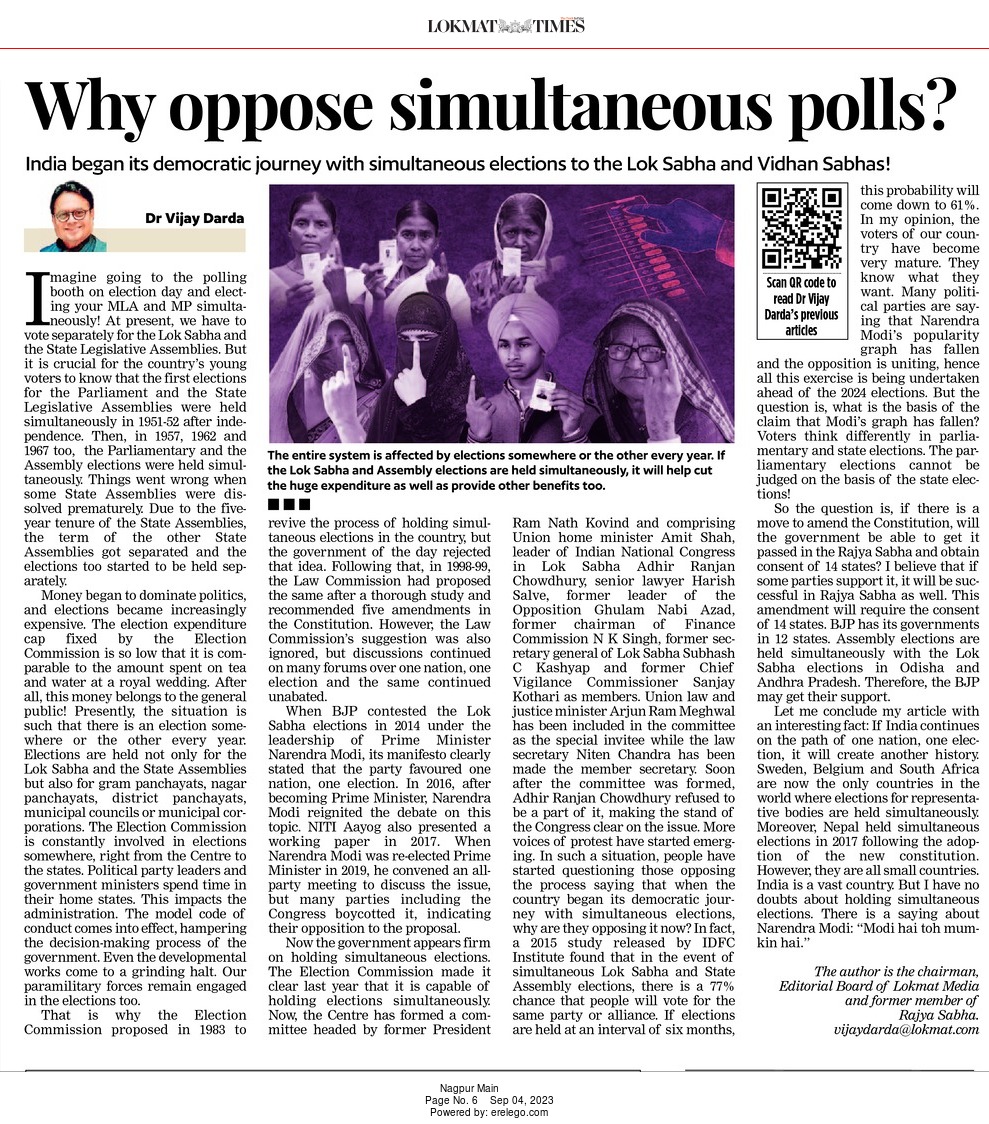Why oppose simultaneous polls?
 By Vijay Darda | 04-09-2023
By Vijay Darda | 04-09-2023
India began its democratic journey with simultaneous elections to the Lok Sabha and Vidhan Sabhas!
Imagine going to the polling booth on election day and electing your MLA and MP simultaneously! At present, we have to vote separately for the Lok Sabha and the State Legislative Assemblies. But it is crucial for the country’s young voters to know that the first elections for the Parliament and the State Legislative Assemblies were held simultaneously in 1951-52 after independence. Then, in 1957, 1962 and 1967 too, the Parliamentary and the Assembly elections were held simultaneously. Things went wrong when some State Assemblies were dissolved prematurely. Due to the five-year tenure of the State Assemblies, the term of the other State Assemblies got separated and the elections too started to be held separately.
Money began to dominate politics, and elections became increasingly expensive. The election expenditure cap fixed by the Election Commission is so low that it is comparable to the amount spent on tea and water at a royal wedding. After all, this money belongs to the general public! Presently, the situation is such that there is an election somewhere or the other every year. Elections are held not only for the Lok Sabha and the State Assemblies but also for gram panchayats, nagar panchayats, district panchayats, municipal councils or municipal corporations. The Election Commission is constantly involved in elections somewhere, right from the Centre to the states. Political party leaders and government ministers spend time in their home states. This impacts the administration. The model code of conduct comes into effect, hampering the decision-making process of the government. Even the developmental works come to a grinding halt. Our paramilitary forces remain engaged in the elections too.
That is why the Election Commission proposed in 1983 to revive the process of holding simultaneous elections in the country, but the government of the day rejected that idea. Following that, in 1998-99, the Law Commission had proposed the same after a thorough study and recommended five amendments in the Constitution. However, the Law Commission’s suggestion was also ignored, but discussions continued on many forums over one nation, one election and the same continued unabated.
When BJP contested the Lok Sabha elections in 2014 under the leadership of Prime Minister Narendra Modi, its manifesto clearly stated that the party favoured one nation, one election. In 2016, after becoming Prime Minister, Narendra Modi reignited the debate on this topic. NITI Aayog also presented a working paper in 2017. When Narendra Modi was re-elected Prime Minister in 2019, he convened an all-party meeting to discuss the issue, but many parties including the Congress boycotted it, indicating their opposition to the proposal.
Now the government appears firm on holding simultaneous elections. The Election Commission made it clear last year that it is capable of holding elections simultaneously. Now, the Centre has formed a committee headed by former President Ram Nath Kovind and comprising Union home minister Amit Shah, leader of Indian National Congress in Lok Sabha Adhir Ranjan Chowdhury, senior lawyer Harish Salve, former leader of the Opposition Ghulam Nabi Azad, former chairman of Finance Commission N K Singh, former secretary general of Lok Sabha Subhash C Kashyap and former Chief Vigilance Commissioner Sanjay Kothari as members. Union law and justice minister Arjun Ram Meghwal has been included in the committee as the special invitee while the law secretary Niten Chandra has been made the member secretary. Soon after the committee was formed, Adhir Ranjan Chowdhury refused to be a part of it, making the stand of the Congress clear on the issue. More voices of protest have started emerging. In such a situation, people have started questioning those opposing the process saying that when the country began its democratic journey with simultaneous elections, why are they opposing it now? In fact, a 2015 study released by IDFC Institute found that in the event of simultaneous Lok Sabha and State Assembly elections, there is a 77% chance that people will vote for the same party or alliance. If elections are held at an interval of six months, this probability will come down to 61%. In my opinion, the voters of our country have become very mature. They know what they want. Many political parties are saying that Narendra Modi’s popularity graph has fallen and the opposition is uniting, hence all this exercise is being undertaken ahead of the 2024 elections. But the question is, what is the basis of the claim that Modi’s graph has fallen? Voters think differently in parliamentary and state elections. The parliamentary elections cannot be judged on the basis of the state elections!
So the question is, if there is a move to amend the Constitution, will the government be able to get it passed in the Rajya Sabha and obtain consent of 14 states? I believe that if some parties support it, it will be successful in Rajya Sabha as well. This amendment will require the consent of 14 states. BJP has its governments in 12 states. Assembly elections are held simultaneously with the Lok Sabha elections in Odisha and Andhra Pradesh. Therefore, the BJP may get their support.
Let me conclude my article with an interesting fact: If India continues on the path of one nation, one election, it will create another history. Sweden, Belgium and South Africa are now the only countries in the world where elections for representative bodies are held simultaneously. Moreover, Nepal held simultaneous elections in 2017 following the adoption of the new constitution. However, they are all small countries. India is a vast country. But I have no doubts about holding simultaneous elections. There is a saying about Narendra Modi: “Modi hai toh mumkin hai.”
Relevant Articles
Ex-Prez Kovind to be chief guest at 4th edition of Lokmat Parliamentary Awards
Why not one election when nation is one?
Jury meeting of ‘Lokmat Maharashtrian of The Year’ awards held
